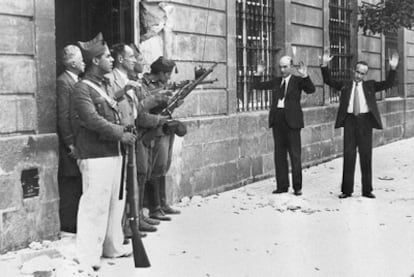Telemadrid pressed to pull plug on "biased" war series
Station says it has not yet decided whether to run rest of documentary episodes after criticism of opening chapter on the murder of Calvo Sotelo
A Telemadrid documentary on the 1939 murder of the politician José Calvo Sotelo shown last Tuesday has caused a political uproar. Socialist directors of the regional station have categorized the work as "tendentious" and "biased" and are demanding that Telemadrid not sign an agreement to air a proposed 13-part series on the civil war, of which The Murder of Calvo Sotelo was just the first part.
The documentary was prepared by the CEU Institute of Historical Studies, part of the Madrid-based San Pablo CEU University Foundation, and given free of charge to Telemadrid. A second episode, The Communist Party and the Defense of Madrid: the Paracuellos del Jarama Massacre, which premiered on the rightwing Intereconomía channel in November of last year, is also ready for airing.
"It shouldn't have been broadcast even if it was free; it is an atrocity"
To date, Telemadrid has not signed a contract for the rest of the series, though a declaration of intent does exist. Board member Eduardo Sotillos plans to ask that this "does evolve to contract level" when the new board of directors holds its first meeting.
A spokesman for Telemadrid said that the decision to air the documentary had been taken somewhat hastily, timed to coincide with the 75th anniversary of the Calvo Sotelo murder on July 13, 1936, and that the episode had not cost the TV station a cent. The spokesman confirmed that "it was donated by the Institute," which is a normal occurrence for Telemadrid, which often receives a pilot episode from producers to be aired before financial negotiations are begun.
"It shouldn't have been broadcast even if it was free," Sotillos stated. "It is an atrocity, and offers a completely biased perspective, a fact that has been confirmed by historians."
The documentary reached an audience level of 6.2 percent, and the Madrid Opina debate show that followed registered its highest audience level so far this year, according to Telemadrid, which continues to insist that it has not yet signed up to the series.
"We have only held talks," said a spokesman, who added that the possible future episodes also feature the defense of Alcázar de Toledo, the battle of the Ebro, and the Republican interrogation centers in Madrid, known as checas, though he was unsure what stage of production the Institute of Historical Studies ha d reached. In defense against criticisms from historians, who have called the work "partisan," irking Telemadrid's management, the spokesman said that "the same events were discussed from many different points of view in a previous debate."
Santos Juliá, professor of social history and political thought at the UNED distance-learning university, called the documentary a "deplorable manipulation" aimed at presenting the Civil War as "the inevitable consequence of the murder" of the right-wing deputy by the Socialists.
The Murder of Calvo Sotelo was shown as part of a special episode of Madrid Opina moderated by Víctor Arribas. The documentary, which was written and directed by Alfonso Bullón de Mendoza, director of the CEU Institute of Historical Studies and author of a biography of Calvo Sotelo, also relied on testimonies from specialists, among whom figured Juan Velarde, an economist with the Popular Party's FAES think-tank and a former Falangist.
Bullón de Mendoza has organized several annual conferences aimed at vindicating "the other memory" of "Socialist and PCE [Communist Party of Spain] crimes" committed under the Republican banner. Not surprisingly, The Communist Party and the Defense of Madrid includes the collaboration of historians such as Ricardo de la Cierva, a man who served as head of the Council for History Studies under Franco.

Tu suscripción se está usando en otro dispositivo
¿Quieres añadir otro usuario a tu suscripción?
Si continúas leyendo en este dispositivo, no se podrá leer en el otro.
FlechaTu suscripción se está usando en otro dispositivo y solo puedes acceder a EL PAÍS desde un dispositivo a la vez.
Si quieres compartir tu cuenta, cambia tu suscripción a la modalidad Premium, así podrás añadir otro usuario. Cada uno accederá con su propia cuenta de email, lo que os permitirá personalizar vuestra experiencia en EL PAÍS.
¿Tienes una suscripción de empresa? Accede aquí para contratar más cuentas.
En el caso de no saber quién está usando tu cuenta, te recomendamos cambiar tu contraseña aquí.
Si decides continuar compartiendo tu cuenta, este mensaje se mostrará en tu dispositivo y en el de la otra persona que está usando tu cuenta de forma indefinida, afectando a tu experiencia de lectura. Puedes consultar aquí los términos y condiciones de la suscripción digital.








































